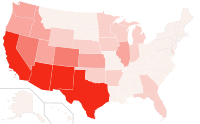
Photo from wikipedia
Chile has established hybrid policies for the administrative distribution of its educational establishments, leading to significant gaps in educational results and school conditions between public, mixed, and private schools. As… Click to show full abstract
Chile has established hybrid policies for the administrative distribution of its educational establishments, leading to significant gaps in educational results and school conditions between public, mixed, and private schools. As a result, there are high levels of segregation, and social and economic vulnerability that put public schools at a disadvantage, affecting their image and causing a constant decrease in enrollment. An abbreviated version of Luhtanen and Crocker’s (1992) collective self-esteem scale was adapted and validated for the Chilean educational context because of its usefulness in studying processes of social segregation and cultural coherence, seeking to identify student perception about the appreciation of school actions in the context of belonging and identification with schools, in order to compare between groups according to types of establishment and assess the effects of school conditions on the perception of students. A representative sample of Chilean secondary students between 9th and 12th grades participated (n = 3635, 52.8% women, average age 15.9 years, SD = 1.1). Descriptive analyses, comparison of means between groups, confirmatory factorial analyses, and multi-group analyses were conducted to test the adjustment and invariance of the unifactorial structure of a reduced version of four items. The results indicated that the scale satisfactorily complies with the proposed adjustment indexes, presents total invariance by gender and partial invariance by administrative dependence, and allows establishing statistically significant differences in the collective self-esteem, indicating a higher score for students in the private system, and a lower score for those in the public system. These results show the negative effects of high school segregation on students’ collective self-esteem, affecting the appreciation of personal, collective, and institutional activities and the sense of belonging. Although previous research has explored some of the effects of school segregation, the present study focuses on collective self-esteem, which is closely related to identity and belonging, and allows for further innovative research on school segregation. The scale is useful as an instrument for researching social conditions of student well-being, in regards to educational management.
Journal Title: Frontiers in Psychology
Year Published: 2020
Link to full text (if available)
Share on Social Media: Sign Up to like & get
recommendations!